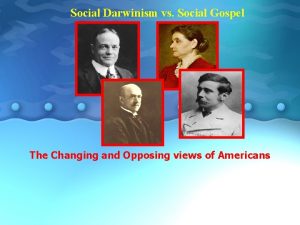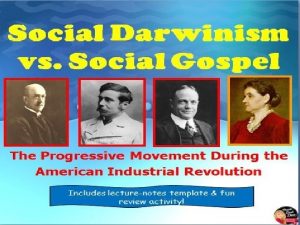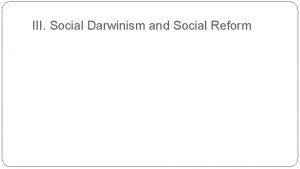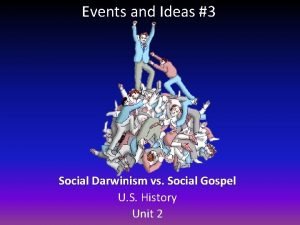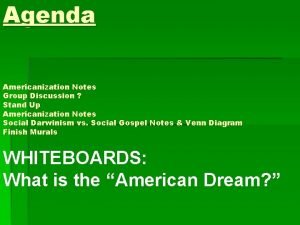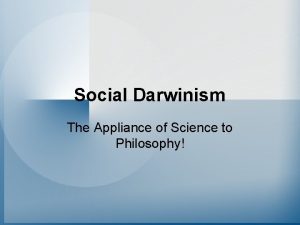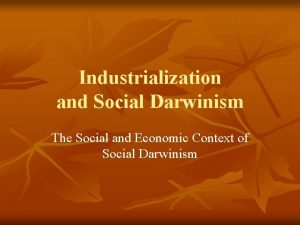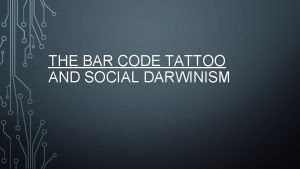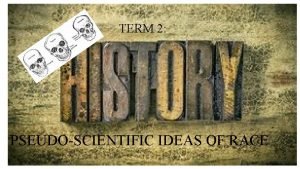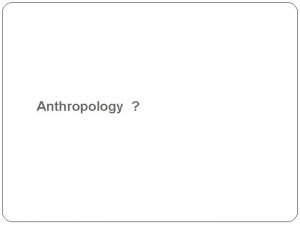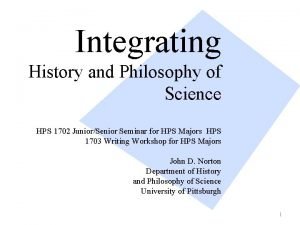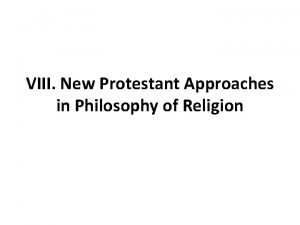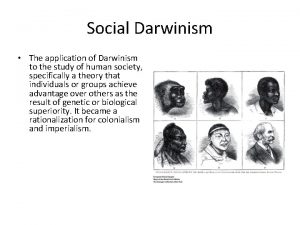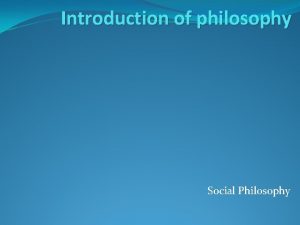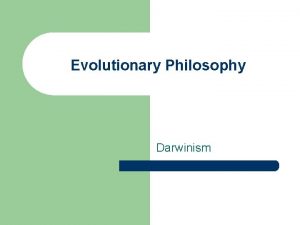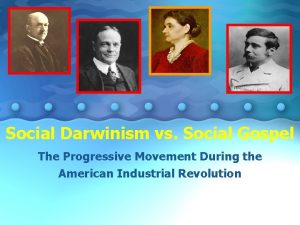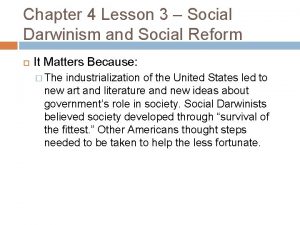Social Darwinism The Appliance of Science to Philosophy

















- Slides: 17

Social Darwinism The Appliance of Science to Philosophy!

Charles Darwin 1809 - 1882 • British Naturalist • HMS Beagle 1831 – 1836 – Plymouth – Galapagos • Tortoises • Finches • Long Gestation Period – Ultra-Cautious • Combines own observations, fossils and embryos – 6, 000 years old? • Articulates work of many other biologists – Lamarck, • Cannot explain ‘how’ • Malthus Influence – Balance • Not enough food to feed all – Struggle for survival


Evolutionary Theory • The resources of an environment are limited. Creatures produce more offspring than can possibly survive. Members of a species must compete for limited resources and for survival. • No two members of a species are exactly alike. Each organism contains an individual combination of inherited traits. Some traits are useful for survival; other traits are not. • Organisms that have useful traits reproduce in greater numbers. Their offspring inherit the traits. Organisms with unfavourable traits eventually die off. The fittest survive. • Nature selects different traits at different times. Varieties within a species gradually create a new species.

The Origin of Species 1859 • Full title – On the Origin of Species by Means of Natural Selection, or the Preservation of Favoured Races in the Struggle for Life • Theory One – Evolution does occur (Descent with Modification) • Theory Two – Evolutionary change is gradual • Theory Three – Evolution takes place through natural selection • Theory Four – Millions of species descend from a single life form through specialisation

Natural Selection • “As many more individuals of each species are born than can possibly survive, and as consequently there is a frequently recurring struggle for existence, it follows that any being, if it vary in any manner profitable to itself, under the complex and sometimes varying conditions of life, will have a better chance of survival and thus be naturally selected. From the strong principle of inheritance, any selected variety will tend to propagate its new and modified form. ”

The Descent of Man 1871 • Charles Darwin considers whether humans, like every other species, are descended from some pre-existing form; • the manner of human development; • the value of the differences between the so-called races of humans.

Whose side is he on? • He thought himself a Liberal – Challenges Liberalism • Are all men born equal? – If differences required – What point are all men equal – Supports Liberalism • Supports progress and change – Impresses Karl Marx • Competition – "an extension to the animal and vegetable world of laissez faire economics. " » Bertrand Russell • Romantic Appeal – Naturalism • Challenges Church – Biblical Immutability – Creationism • “An embarrassing discovery and the less said about it the better. ”

Herbert Spencer • Predates & Overlaps Darwin • The Development Hypothesis 1852 • A Theory of Population, Deduced from the General Law of Animal Fertility 1852 – Natural Selection Mechanism – But exclusively Human – he proposed that those humans who invested less in reproduction and more in education were better off and would therefore eventually become the select members of their generation • Father of Social Darwinism • Coins “Evolution” and “Survival of the Fittest”

Herbert Spencer’s ‘Survival of the Fittest’ • And here it must be remarked, that the effect of pressure of population [. . . ] is not a uniform effect, but an average one. [. . . ] For as those prematurely carried off must, in the average of cases, be those in whom the power of self-preservation is the least, it unavoidably follows, that those left behind to continue the race are those in whom the power of self-preservation is the greatest-are the select of their generation.

Social Darwinism • Social Scientists Applying a Law of Nature to Human Societies • The notion that Human affairs are a jungle in which only the fittest of nations, classes, or individuals will survive. • Both societies and organisms grow during most of their existence; baby to adult, town to city. – As they grow, they become increasingly complex. • Imperialists are big fans

Justifying Imperalism • “Within the human species, nations are locked in a struggle for survival. Everywhere, civilized nations are supplanting barbarous nations. Advanced civilization, obviously, has inherited valuable traits from its ancestors. Underdeveloped cultures, except in hostile climates, will soon die off. Therefore, natural order obligates powerful, civilized nations to appropriate the limited resources of the weak. ”

Social Evolution • Societies move from simple structures to various levels of compound structures. – Simple: consists of separate families. – Compound: consists of families organized into clans. – Doubly Compound: Clans are organized into tribes. – Trebly Compound: Tribes are further organized into nations. • An increase in size of the society results in increase in structure, which in turn produces differences in power and roles of the members. Different members or groups of members also start to play different, specialized roles. • There is a movement from a military to an industrial society. – At the beginning, society is characterized by the compulsory cooperation of its members -- the military society. – The industrial society is characterized by the voluntary cooperation of its members. – The highest order is called the Ethical State, where common resources may be used to perfect the human character

Racial Theories • Appealed to Nationalists and Romantics – Idea of Unique Racial Kinship Groups – Blood forms a distinct and special stream • Caucasian Race invented late 18 th Century • Aryan Race first used to refer to Caucasians in 1848 • England – Experiments to prove Anglo-Saxon descendents more intelligent than Celtic descendents

Houston Stewart Chamberlain 1855 - 1927 • • Englishman living in Germany Challenges Social Darwinist Inevitability Race Struggle Credits Teutons as the most Creative Culture – Germans are the last true Aryan branch • Blames the Jew Paul for racial chaos of Roman Empire – “True history begins from the moment when the German with mighty hand seizes the inheritance of antiquity” • Anti-Semite – “Whoever maintains that Christ was a Jew is either ignorant or dishonest” • Germans need to suppress Judaism to save world from racial intermingling, degeneracy & racial chaos

Rousseau Charles Darwin Kant Herbert Spencer Hegel Houston Chamberlain Schopenhauer Nietzsche Nationalism/ Fascism

Question • “The fascist regimes which emerged in the 1920 s and 1930 s adopted an aggressive nationalism which was developed from the Romantic movement of the nineteenth century. ” To what extent do you agree with this statement
 Define social darwinism and social gospel.
Define social darwinism and social gospel. Social gospel vs social darwinism
Social gospel vs social darwinism What was reform darwinism?
What was reform darwinism? Social darwinism vs social gospel
Social darwinism vs social gospel Social darwinism and social gospel venn diagram
Social darwinism and social gospel venn diagram Frankel appliance classification
Frankel appliance classification Philosophy of herbert spencer in education
Philosophy of herbert spencer in education Social darwinism industrial revolution
Social darwinism industrial revolution Darwinism definition
Darwinism definition The barcode tattoo summary
The barcode tattoo summary Social darwinism
Social darwinism Explain the pseudoscientific ideas of social darwinism
Explain the pseudoscientific ideas of social darwinism The principal message of this cartoon is that standard oil
The principal message of this cartoon is that standard oil Favourite subject science
Favourite subject science Natural vs social science
Natural vs social science Anthropology vs sociology
Anthropology vs sociology Philosophy of science
Philosophy of science Philosophy of science
Philosophy of science
